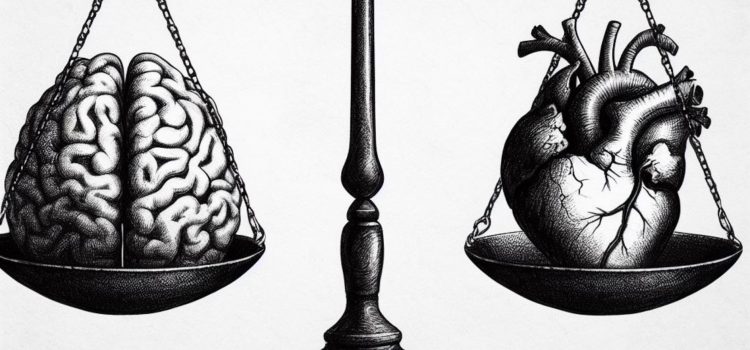
How do you know whether reason or emotion is the right voice to listen to? What’s the best way to make decisions?
Reason and emotion both have a role to play in making decisions and living a good life, and philosophers have suggested choosing reason over emotion or aligning reason and emotion. Understanding each of these perspectives can help you live life better.
Keep reading for more on living a rational life and balancing reason with emotion.
A Good Life Is Aligned With Reason
One perspective on what makes a good life involves living rationally—considering the options available to you, weighing their possible outcomes, and choosing the best option—rather than making moral decisions based on momentary whims, impulses, or intuitions. Reason and emotion are not equally reliable.
Stoic philosopher Marcus Aurelius and ancient Greek philosopher Aristotle offer two different approaches to living a good, rational life:
1) Choose Reason Over Emotion
Marcus Aurelius (Meditations) believes a good, rational life is lived strictly according to reason and nothing else. He explains that the universe itself functions according to reason alone—that is, rules and systems work in harmony to ensure that whatever is supposed to happen, happens. Therefore, by living in alignment with reason, you become in harmony with the universe and your role in it. This makes you not only morally good but also good at the “job” of existing as a human being.
To Harmonize With the Universe, Eliminate Negative Emotion
To be fully in harmony with the universe, Marcus Aurelius explains, you must strive to eliminate all negative emotions. According to him, feeling negative emotions is a choice: These emotions don’t come from external events, which are out of your control, but instead from your interpretation of those events, which are in your control.
- For example, Bob steps on John’s foot. John can choose to interpret this event in multiple ways: He could assume Bob meant him harm, an interpretation that would make him angry at Bob. Or he could assume it was an accident, an interpretation that wouldn’t make him angry. Either way, John’s emotional reaction is to his interpretation of Bob’s action, not to the action itself.
After establishing that feeling negative emotion is a choice, Marcus Aurelius stresses it’s never the correct choice—there’s no logical reason to experience negative emotion. Even if you suffer extreme misfortune or someone is trying their hardest to harm you, getting upset, angry, or afraid won’t change those realities. Giving in to negative emotions will only distract you from making the best, most logical choices in life.
2) Align Reason and Emotion
Unlike Marcus Aurelius, the ancient Greek philosopher Aristotle’s (Nicomachean Ethics) ideal rational life allows for emotion—but only after you’ve “trained” your emotions to align with reason. In other words, if you rationally think something is moral, you’ll feel positively about it. But if you rationally think something is immoral, you’ll feel negatively about it. Aristotle believes aligning emotion and reason—rather than eliminating emotion—is important because a good person isn’t emotionally unaffected by moral goods and evils. They desire good and are repulsed by evil, and these emotions help motivate them to live morally.
For example, good person Alex sees a child being mistreated by their parents. Rationally, he knows mistreating children is immoral and that stepping in is the moral thing to do. Emotionally, he feels upset seeing the child being mistreated and desires the mistreatment to stop. His reason tells him what to do and his emotions inspire him to do it.






